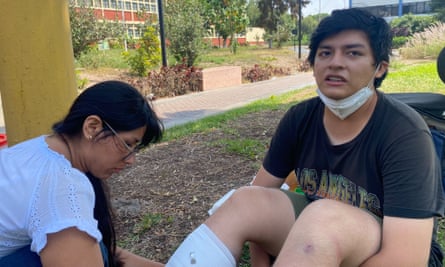Hundreds of police raided the University of Lima on Saturday, breaking down the gates with armored vehicles, firing tear gas and arresting more than 200 people who had come to the Peruvian capital to take part in anti-government protests.
Pictures show dozens of people lying face down on the ground after a police crackdown at the University of San Marcos. The students said they were pushed, kicked and beaten with sticks after being evicted from their dormitories.
Police raid oldest San Marcos university America – The latest in a series of insults calling for President Tina Polwart to step down after six weeks of unrest that have left 60 dead, at least 580 injured and more than 500 arrested.
With protests and roadblocks paralyzing much of the country, Peruvian authorities on Saturday ordered the closure “until further notice” of the Inca Trail leading to the Inca citadel and World Heritage site of Machu Picchu – Peru’s biggest tourist attraction. Over a million visitors per year.
Peru’s tourism ministry said on Saturday that rescue teams had evacuated more than 400 stranded tourists from the iconic site.
“This afternoon 418 domestic and foreign visitors were transferred from the city of Machu Picchu to … Cuzco,” the ministry’s Twitter account posted, along with photos of a train and passengers.
The Demonstrations It began in early December in favor of ousted former president Pedro Castillo, but has largely shifted to demanding Polwart’s resignation, the shutdown of Congress and new elections.
Castillo’s deputy was the 60-year-old Bolavarte, who was replaced after a tryout. Shutter Congress and ruled by decree dated 7th December.
Many of those arrested in Saturday’s raid had traveled from southern Peru to the capital to take part in Thursday’s demonstration. “Taking Lima” It began peacefully but descended into clashes between protesters and riot police amid stone-pelting and teargas volleys.
In a statement TwitterUN Human Rights The High Commissioner’s Office called on Peruvian authorities to “ensure legality and proportionality”. [police] Guarantees of intervention and due process.”
It emphasized the importance of the presence of absentee prosecutors in the first hours of the trial.
Students living in dormitories said they were violently evicted from their rooms by armed police, who broke down doors, used trolleys and kicked them out.
Esteban Godofredo, a 20-year-old political science student, was treated for leg injuries.
“He [a police officer] hit me with his stick, he threw me to the ground and started kicking me,” said Godofreto, who sat on the grass outside the house with his badly bruised, bandaged right calf.

Videos seen by the Guardian showed confused and frightened students huddled outside their halls, some still in their pyjamas, as riot police shouted orders and insults. The youths were forced to stand against the wall or kneel in rows.
“They pointed their guns at us and yelled, ‘Get out.’ We didn’t have time to get our IDs,” said 20-year-old Jenny Fuentes, a student teacher.
“They forced us to kneel. Many girls were crying but they told us to shut up. They didn’t tell us why we were kicked out of our rooms.
A group of about 90 students, who were staying on campus for work and study during the summer vacation, were then marched to the main courtyard, a 10-minute walk away, where others were detained.
Hours after the raid, they were not allowed to return to their rooms, which were searched by the police.

“I was a student at San Marcos [University] We haven’t experienced this kind of outrage since the 1980s,” said one congresswoman, Suzelle Paredes, as she was prevented from entering the compound by a police cordon.
“The police have entered the university residence, the rooms of female students who have no connection with the protesters. They threatened them while they were sleeping and took them out of their rooms.
Paredes said it was a flashback to regular police and armed forces raids at the public university in the 1980s and ’90s, when the campus was seen as a subjugation ground during the state’s conflict with Mao-inspired Shining Path rebels.
“We are not at that time, we are under a democratic government that respects fundamental rights,” Paredes said.
Agence France-Presse contributed to this report